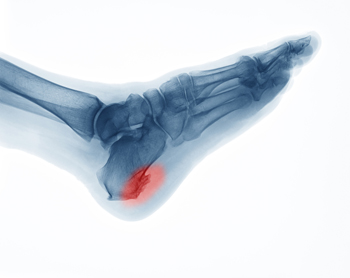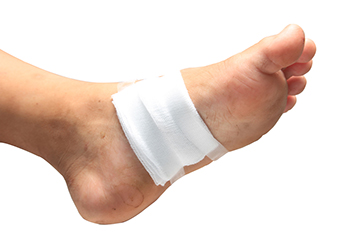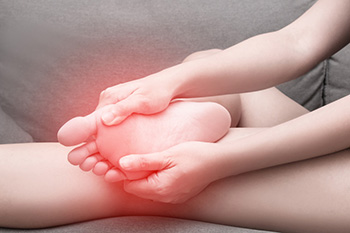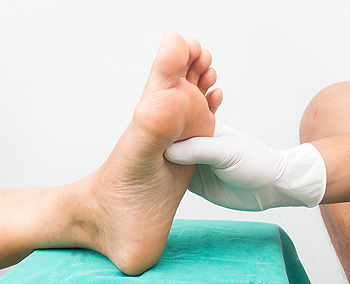Freehold (732) 294-9393
Freehold (732) 294-9393

A heel spur is a small growth that forms from extra calcium deposits on the heel bone of the foot. The deposits often stretch from the heel bone to the arch area. They can be quite painful and interfere with normal functioning. Causes of heel spur development include wearing ill-fitting shoes, such as high heels, where pressure is transferred from the heel to the front of the foot. Having flat feet can also lead to the development of heel spurs due to increased pressure on the heel. Bruising can also be a cause for heel spurs because of repeated trauma on the heel. A stone bruise is a particular type of bruise most apt to turn into a heel spur. Such bruises are most common among athletes and runners. The activities can cause bruises to the fatty tissue, fibrous tissue, and heel pad located under the heel bone. When the heel pad wears down from repeated stress, there is less protection, and calcium deposits can form, which in turn can develop into heel spurs. If you have a heel spur and it is causing you discomfort, it is suggested that you make an appointment with a podiatrist for appropriate treatment.
Heel spurs can be incredibly painful and sometimes may make you unable to participate in physical activities. To get medical care for your heel spurs, contact Dr. Henry Miller from New Jersey. Our doctor will do everything possible to treat your condition.
Heels Spurs
Heel spurs are formed by calcium deposits on the back of the foot where the heel is. This can also be caused by small fragments of bone breaking off one section of the foot, attaching onto the back of the foot. Heel spurs can also be bone growth on the back of the foot and may grow in the direction of the arch of the foot.
Older individuals usually suffer from heel spurs and pain sometimes intensifies with age. One of the main condition's spurs are related to is plantar fasciitis.
Pain
The pain associated with spurs is often because of weight placed on the feet. When someone is walking, their entire weight is concentrated on the feet. Bone spurs then have the tendency to affect other bones and tissues around the foot. As the pain continues, the feet will become tender and sensitive over time.
Treatments
There are many ways to treat heel spurs. If one is suffering from heel spurs in conjunction with pain, there are several methods for healing. Medication, surgery, and herbal care are some options.
If you have any questions feel free to contact our office located in Freehold, NJ . We offer the latest in diagnostic and treatment technology to meet your needs.

Parents have been experts on wound care for their family for many years. Bandages and antiseptic medications are standard medicine cabinet items in most houses. Certain areas of the body, such as the feet and toes, can be a bit more problematic when dealing with wounds. Any time you sustain an injury, such as a puncture wound or injury that will not stop bleeding, it is essential that you seek immediate medical help. But for other types of wounds, injuries, or sores, home care may be sufficient. For instance, in most cases, a blister on the foot will heal itself, given enough time. But if a blister pops, the risk of infection increases and protecting it with a bandage that provides cushioning is a good idea. Sores on the feet and toes can pose additional problems that can be solved with special bandages that fit odd-shaped areas. Keeping these dry and changing them regularly is essential. For any type of sore or wound on the foot that is causing increased pain or showing signs of infection, it is suggested that you visit a podiatrist.
Wound care is an important part in dealing with diabetes. If you have diabetes and a foot wound or would like more information about wound care for diabetics, consult with Dr. Henry Miller from New Jersey. Our doctor will assess your condition and provide you with quality foot and ankle treatment.
What Is Wound Care?
Wound care is the practice of taking proper care of a wound. This can range from the smallest to the largest of wounds. While everyone can benefit from proper wound care, it is much more important for diabetics. Diabetics often suffer from poor blood circulation which causes wounds to heal much slower than they would in a non-diabetic.
What Is the Importance of Wound Care?
While it may not seem apparent with small ulcers on the foot, for diabetics, any size ulcer can become infected. Diabetics often also suffer from neuropathy, or nerve loss. This means they might not even feel when they have an ulcer on their foot. If the wound becomes severely infected, amputation may be necessary. Therefore, it is of the upmost importance to properly care for any and all foot wounds.
How to Care for Wounds
The best way to care for foot wounds is to prevent them. For diabetics, this means daily inspections of the feet for any signs of abnormalities or ulcers. It is also recommended to see a podiatrist several times a year for a foot inspection. If you do have an ulcer, run the wound under water to clear dirt from the wound; then apply antibiotic ointment to the wound and cover with a bandage. Bandages should be changed daily and keeping pressure off the wound is smart. It is advised to see a podiatrist, who can keep an eye on it.
If you have any questions, please feel free to contact our office located in Freehold, NJ . We offer the newest diagnostic and treatment technologies for all your foot care needs.

Foot pain is common, and it is important to find the cause in order to treat it properly. Sometimes foot pain will be temporary, and rest is all that is needed. However, if this pain continues, it is important to seek medical help so that it does not get worse. Conditions that can cause foot pain include, wearing shoes that do not fit properly, Achilles tendonitis or rupture, and bone spurs. Achilles tendonitis occurs from overuse of the Achilles tendon. Anyone can be affected by this injury, but athletes are particularly prone to this condition. An Achilles tendon rupture can occur suddenly, and intense pain is felt in the back of the foot and into the calf. With an Achilles tendon rupture, surgery is sometimes necessary. Bone spurs can result from bone injuries. Generally there is only pain with a bone spur when it is larger or if it is angled in such a way that it presses on nerves. Shoes become difficult to wear and standing for a prolonged time is challenging. At times, the extra bone needs to be shaved to reduce pain. If you have foot pain that does not get better in a reasonable time or worsens, it is suggested that you consult with a podiatrist for a proper diagnosis and treatment.
Foot Pain
Foot pain can be extremely painful and debilitating. If you have a foot pain, consult with Dr. Henry Miller from New Jersey. Our doctor will assess your condition and provide you with quality foot and ankle treatment.
Causes
Foot pain is a very broad condition that could be caused by one or more ailments. The most common include:
Diagnosis
To figure out the cause of foot pain, podiatrists utilize several different methods. This can range from simple visual inspections and sensation tests to X-rays and MRI scans. Prior medical history, family medical history, and any recent physical traumatic events will all be taken into consideration for a proper diagnosis.
Treatment
Treatment depends upon the cause of the foot pain. Whether it is resting, staying off the foot, or having surgery; podiatrists have a number of treatment options available for foot pain.
If you have any questions, please feel free to contact our office located in Freehold, NJ . We offer the newest diagnostic and treatment technologies for all your foot care needs.

Diabetes is a serious condition that can happen from elevated glucose levels in the blood. Most diabetic patients are aware of the potential damage this condition can cause to the feet, and it is urged to practice proper diabetic foot care. Wounds on the feet can heal slower in people who are diabetic, and it is important to check daily for any cuts or scrapes that may have developed. Neuropathy is a condition that can affect people who have diabetes, and it causes the inability to feel sensations on the feet. Diabetic foot care can start with washing and drying the feet daily, followed by inspecting the entire foot, including the soles. This can be accomplished by using a mirror, or perhaps a family member or caregiver can help. Additionally, it is beneficial the toenails are cut weekly, and this is generally performed by a podiatrist. It is helpful to refrain from walking barefoot indoors or outdoors, which may prevent the feet from being cut. If you have diabetes, it is strongly suggested that you are under the care of a podiatrist who can help you to manage this condition.
Diabetic foot care is important in preventing foot ailments such as ulcers. If you are suffering from diabetes or have any other concerns about your feet, contact Dr. Henry Miller from New Jersey. Our doctor can provide the care you need to keep you pain-free and on your feet.
Diabetic Foot Care
Diabetes affects millions of people every year. The condition can damage blood vessels in many parts of the body, especially the feet. Because of this, taking care of your feet is essential if you have diabetes, and having a podiatrist help monitor your foot health is highly recommended.
The Importance of Caring for Your Feet
Patients with diabetes should have their doctor monitor their blood levels, as blood sugar levels play such a huge role in diabetic care. Monitoring these levels on a regular basis is highly advised.
It is always best to inform your healthcare professional of any concerns you may have regarding your feet, especially for diabetic patients. Early treatment and routine foot examinations are keys to maintaining proper health, especially because severe complications can arise if proper treatment is not applied.
If you have any questions please feel free to contact our office located in Freehold, NJ . We offer the newest diagnostic and treatment technologies for all your foot and ankle needs.